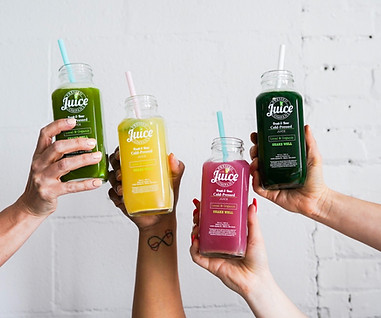Weight Gain Among Young Adults and College Students
Drink Smart
We all know how bad soda and energy drinks can be for us. "Do you know much much sugar is in that?" "Do you know the effects of all of that caffeine on your heart?" "How many calories are you having in one drink?" These are all comon things heard or said about the beverage choices made by young adults. Due to how much information has been put out there over the years, many students have been making healthier choices. Numerous students and adults alike have started to carry reusable water bottles, ensuring they're able to stay hydrated throughout the day. However, a common alternative for students is juice. While fruits and vegetables containg a significant amount of vitamins and minerals needed in the daily diet, there is still a significant amount of sugar. Many believe they are better off having a blend of fruits in a juice form alongside their meals, or even in the middle of class. However, it's not nearly as hydrating or healthy as it seems!


Or Don't Drink At All!
Many college students rely on alcohol as a means to relieve their stress. Most probably do not reaize that every gram of alcohol is 7 calories. A simple night out drinking can result in the consumption of hudreds of empty calories! On average, women consume over 150 calories in alcohol a week, while men are are nearly double. Along with the weight gain from the unhealthy beverage, there is also an increase for numerous health conditions. Those who drink have a higher chance of increasing their LDL, or bad cholesterol. there is also a tisk for developing high blood pressure, as well as diabetes and cardiovascular diseases. Men are more likely than women to drink their woes away, putting them at a higher risk of developing these various conditions than women. The increase in alochol consumption has led to a rise in chronic disease development in young adults.
So Who is the Culprit?
Eating food makes us feel good. This is something we've all experienced at one point or another in our lifetime. The biggest problem is that the cheapest, greasiest, and most calorie dense foods are the ones that seem to bring us the most comfort when we need it. The stress of work and college, coupled with not having a lot of money, leads students to go for what's cheapest. In most cases, it's fast food or whatever is available in the dining hall. Another problem though, is time. With no time to cook and consume a full meal between studying for exams and rushing to work, many settle for snacks. In times of extreme stress, we eat even worse than anyone would care to admit. All of these factors, coupled with the lack of physical activity, has led many to gain weight and develop unhealthy eating habits. These all have contributed to the increase in young adults becoming overweight, or even obese.
versus

Is it Really THAT Serious?
Actually, yes. Numerous students do not fulfill their daily dietary requirement for fruits and vegetables. Generally speaking, men are more comfortable with their bodies than women. This leads women tobe more inclined to do something about their diet and amount of physical activity, taking motivation from their desire to feel better. There are students who are aware of how dangerous and easy it is to get lost in eating one's stress and feelings away, but that does not significantly detract from the vast majority of students who don't stop to think about how they are affected by what they eat. Moreso, minorities are at a higher risk for developing conditions related to obesity, such as diabetes and cardiovascular conitions. This is due to genetic factors as well as external factors, such as socioeconomic status. Even still, there remains cause for concerns for the future generation of the workers in the United States.





